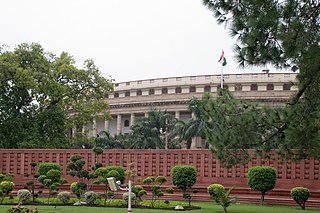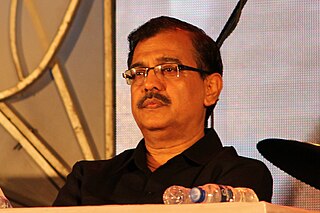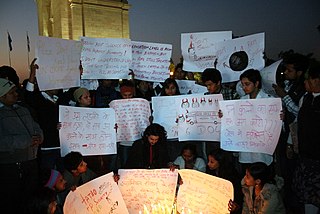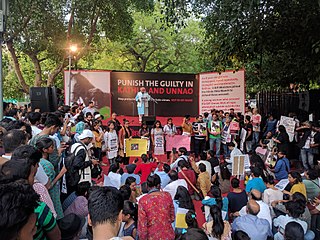The Best Bakery case was a legal case involving the burning down of the Best Bakery, a small outlet in the Hanuman Tekri area in Vadodara, Gujarat, India, on 1 March 2002. During the incident, a mob targeted the Sheikh family who ran the bakery and had taken refuge inside, resulting in the deaths of 14. This case has come to symbolize the carnage in 2002 Gujarat riots that followed the Godhra train Massacre. All the 21 accused were acquitted by the court due to shoddy police work and issues with evidence. It was the first case to be tried with respect to the Godhra riots.
Encounter killing is a term used in India and Pakistan since the late 20th century to describe extrajudicial killings by the police or the armed forces, supposedly in self-defence, when they encounter suspected gangsters or terrorists. In the 1990s and the mid-2000s, the Mumbai Police used encounter killings to attack the city's underworld, and the practice spread to other large cities. In Pakistan, the Sindh Police is notorious for extrajudicial killings through fake encounters especially in Karachi.

The 2001 Indian Parliament attack was a terrorist attack on the Parliament of India in New Delhi, India on 13 December 2001. The perpetrators belonged to Lashkar-e-Taiba (LeT) and Jaish-e-Mohammed (JeM) - two Pakistan-raised terrorist organization. The attack led to the deaths of six Delhi Police personnel, two Parliament Security Service personnel, a ward staff, and a gardener – in total 10 – and led to increased tensions between India and Pakistan, resulting in the 2001–02 India–Pakistan standoff. The 5 terrorists were killed outside the parliament.
Siddharth Vashisht, better known as Manu Sharma, is an Indian murderer, convicted in 2006 to serving life imprisonment for the 1999 murder of Jessica Lal, but was released in June 2020, 14 years into the sentence, for good conduct during the jail time. Sharma is the son of the former Indian National Congress leader Venod Sharma and the brother of media baron Kartikeya Sharma.

Jessica Lal was a model in New Delhi who was working as a celebrity barmaid at a crowded socialite party when she was shot dead at around 2.00am on 30 April 1999. Dozens of witnesses pointed to Siddharth Vashisht, also known as Manu Sharma, the son of Venod Sharma, a wealthy and influential Congress-nominated Member of Parliament from Haryana, as the murderer. Manu Sharma was later convicted for the murder and sentenced to prison.
Priyadarshini Mattoo was a 25-year-old law student who was found raped and murdered at her house in New Delhi on 23 January 1996. On 17 October 2006, the Delhi High Court found Santosh Kumar Singh guilty on both counts of rape and murder and on 30 October of the same year sentenced him to death. On 6 October 2010, the Supreme Court of India commuted the death sentence to life imprisonment. Santosh Kumar Singh, the son of an Inspector-General of Police, had earlier been acquitted by a trial court in 1999, and the High Court decision was widely perceived in India as a landmark reversal. This decision was overturned as the facts were not presented correctly in the lower court.

Pramod Vyankatesh Mahajan was an Indian politician from Maharashtra. A second-generation leader of the Bharatiya Janata Party (BJP), he belonged to a group of relatively young "technocratic" leaders who lacked a reasonably strong grassroot political base, although he was fairly popular in his home state. At the time of his death, he was in a power struggle for the leadership of the BJP, given the imminent retirement of its aging top brass.

Nitish Katara was a 25-year-old Indian business executive in Delhi who was murdered in the early hours of 17 February 2002 by Vikas Yadav. Yadav was the son of influential criminal-politician D. P. Yadav. Katara had recently graduated from the Institute of Management Technology in Ghaziabad where he had fallen in love with his classmate Bharti Yadav, sister of Vikas Yadav. The trial court held that Katara's murder was an honour killing because the family did not approve of their relationship. Vikas and Vishal Yadav were later found guilty by the trial Court and both were given life sentences on 30 May 2008. On 2 April 2014 the Delhi High Court upheld the trial court verdict of life imprisonment for the accused. On 6 February 2015, Delhi High Court on re-appeal on death sentence, extended sentence as 25 years' rigorous life imprisonment without remittance. On 9 September 2015, The Supreme Court of India rejected a plea by Neelam Katara seeking enhancement of sentence to death for Vishal and Vikas Yadav On 3 October 2016, the Supreme Court sentenced Vikas and Vishal Yadav, as well as Sukhdev Pehelwan, the third accused, to 25 years' imprisonment without remission.
The Sohrab Uddin Sheikh encounter case was a criminal case in the Gujarat state after the death of Sohrabuddin Anwarhussain Sheikh on November 26, 2005. A special CBI court acquitted all the 22 accused in the case in the alleged encounter killing of Sohrabuddin Sheikh and his wife.

Ujjwal Nikam is an Indian special public prosecutor who has worked on prominent murder and terrorism cases. He helped prosecute suspects in the 1993 Bombay bombings, the Gulshan Kumar murder case, the Pramod Mahajan murder case, and the 2008 Mumbai attacks. He was also the special public prosecutor in the 2013 Mumbai gang rape case, 2016 Kopardi rape and murder case. Ujjwal Nikam argued on behalf of the state during the 26/11 Mumbai attack trial.
Suhaib Ilyasi is an Indian television producer and director. He was the host of the notable TV crime show India's Most Wanted. He was the editor of the news magazine Bureaucracy Today' After his wife died in 2000, Ilyasi was charged under Section 304B of the Indian Penal Code for dowry death. He also got involved in a legal battle with his in-laws for the custody of his daughter. Ilyasi was acquitted in a passport case, while the charges 498A and 304B were also not proven and Ilyasi was discharged for the aforesaid charges in the trial court. Later, he was charged with murdering his wife after 14 years of the incident. On December 20, 2017, he was convicted for the murder and sentenced to life imprisonment. On 5 October 2018, Delhi High Court acquitted him, stating that there was no evidence against him on record to sustain the conviction.

Daag: The Fire is a 1999 Indian action drama thriller film written, produced and directed by Raj Kanwar, starring Sanjay Dutt, Chandrachur Singh and Mahima Chaudhry in the lead roles. The film received mixed reviews but achieved Superhit status at the end of its theatrical run. One of the strongest criticisms was that despite the title, there was neither a stain nor a fire. Raj Kanwar claimed that the title was a reference to the dualism intrinsic to nature, such as the Yin and the Yang. This was however lost on viewers.
The Manoj–Babli honour killing case was the honour killing of Indian newlyweds Manoj Banwala and Babli in June 2007 and the subsequent court case which historically convicted defendants for an honour killing. The accused in the murder included relatives of Babli. Relatives of Manoj, especially his mother, defended the relationship. The killing was ordered by a khap panchayat (khap), a religious caste-based council among Jats, in their Karora village in Kaithal district, Haryana. The khap passed a decree prohibiting marriage against societal norms. Such caste-based councils are common in the inner regions of several Indian states, including Haryana, Punjab, western Uttar Pradesh and parts of Rajasthan, and have been operating with government approval for years. In any event, the state government expressed no concern about the ruling of the khap panchayat.
Naina Sahni Sharma was the victim of Tandoor murder case. On 2 July 1995, she was killed by her husband Sushil Sharma, a Congress youth leader and MLA. Naina herself was a worker in the Congress party. Sushil Sharma was convicted for the murder by the Trial Court, Delhi High Court and Supreme Court. On 8 October 2018, Sharma was sentenced to life imprisonment by the Supreme Court.
The Hashimpura massacre is an incident of mass murder which took place on or around 22 May 1987 near Meerut in Uttar Pradesh state, India, during the 1987 Meerut communal riots during March to June 1987 with a death toll of 350. It is alleged that 19 personnel of the Provincial Armed Constabulary rounded up 42 Muslim youths from the Hashimpura mohalla (locality) of the city, took them to the outskirts of the city, shot them in cold blood and dumped their bodies in a nearby irrigation canal. A few days later, the dead bodies were found floating in the canal and a case of murder was registered. Eventually, 19 men were accused of having performed the act. In May 2000, 16 of the 19 accused surrendered and were later released on bail. Whereas, the other three accused died in the intervening period. In 2002, the Supreme Court of India ordered that the case trial should be transferred from the Ghaziabad district court to a Sessions Court at the Tis Hazari court complex in Delhi.

The 2012 Delhi gang rape and murder case involved a rape and fatal assault that occurred on 16 December 2012 in Munirka, a neighbourhood in South Delhi. The incident took place when Jyoti Singh, a 23-year-old female physiotherapy intern, was beaten, gang-raped, and tortured in a private bus in which she was travelling with her male friend. There were six others in the bus, including the driver, all of whom raped the woman and beat her friend. Eleven days after the assault she was transferred to a hospital in Singapore for emergency treatment but died two days later. The incident generated widespread national and international coverage and was widely condemned, both in India and abroad. Subsequently, public protests against the state and central governments for failing to provide adequate security for women took place in New Delhi, where thousands of protesters clashed with security forces. Similar protests took place in major cities throughout the country. Since Indian law does not allow the press to publish a rape victim's name, the victim was widely known as Nirbhaya, meaning "fearless", and her struggle and death became a symbol of women's resistance to rape around the world.
Sankararaman murder case was a case on the murder of Sankararaman, the manager of Varadharaja Perumal Temple in Kanchipuram, a town in the South Indian state of Tamil Nadu. He was murdered in the premises of the temple on 3 September 2004.

Rampal is a convicted Indian religious leader (godman), who claims to be spiritual successor and an incarnation of Kabir. He is currently under a life sentence for murder in the Hisar Central jail.

The Kathua rape case involved the abduction, gang rape, and murder of an 8-year-old girl, Asifa Bano, in January 2018 in the Rasana village near Kathua in Jammu and Kashmir, India. A chargesheet for the case was filed, the accused were arrested and the trial began in Kathua on 16 April 2018. The victim belonged to the nomadic Bakarwal community. She disappeared for a week before her body was discovered by the villagers a kilometer away from the village. The incident made national news when charges were filed against eight men in April 2018. The arrests of the accused led to protests by the Panthers Party, along with other local groups. One of the protests, in support of the accused, was attended by two ministers from the Bharatiya Janata Party, both of whom later resigned. The gang rape and murder, as well as the support the accused received, sparked widespread outrage. On 10 June 2019, six of the seven defendants were convicted and one acquitted. Three of those convicted were sentenced to life in prison and three to five years. In October 2019, court ordered a First Information Report (FIR) against 6 members of the Special Investigation Team (SIT), which probed the case, for allegedly torturing and coercing witnesses to give false statements.
Rebecca Mammen John is an Indian lawyer, working primarily in the field of criminal defense. She has represented parties in several widely reported cases, including the families of victims of the 1987 Hashimpura massacre, Indian stockbroker Harshad Mehta, and the accused in the Aarushi murder case. She has also been appointed as a Special Public Prosecutor on occasion by the High Court of Delhi, and frequently comments in leading newspapers and the media on issues of criminal justice reform in India.








